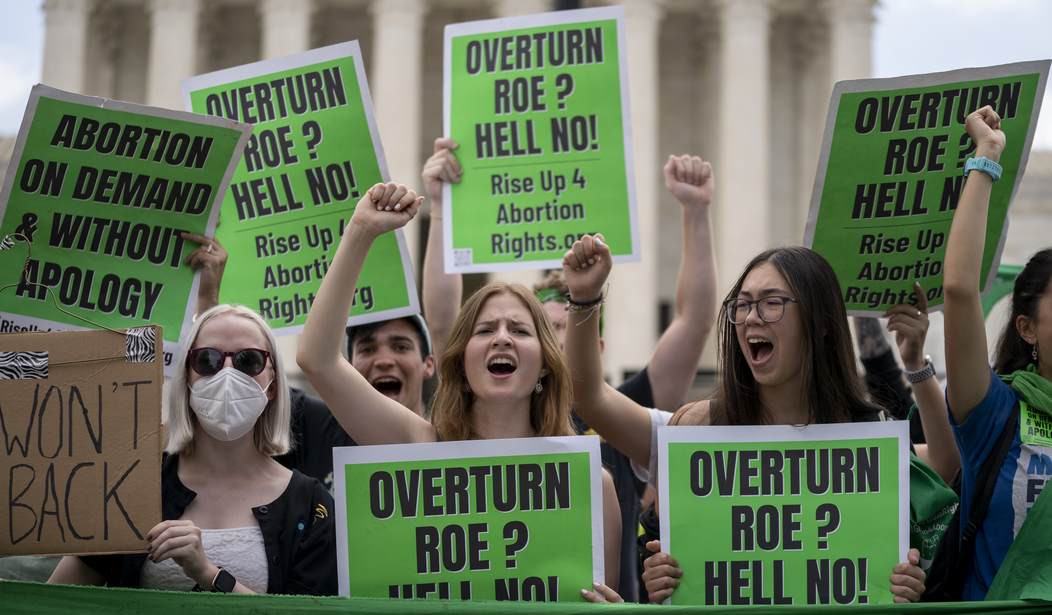With the U.S. Supreme Court overturning Roe v. Wade with its Dobbs v. Jackson decision last month, abortion has been propelled to a top election issue, at least compared to years prior. It's still worth emphasizing that economic issues are of greater importance to voters. The abortion issue is also at times credited with giving Democrats a slight boost on the congressional ballot as the November midterm elections are quickly approaching.
One poll showing Democrats with a gain is the USA Today/Suffolk University poll released on Thursday, with a 44 percent advantage compared to Republicans' 40 percent.
Republicans still remain favored to regain control of the U.S. House of Representatives, with the U.S. Senate considered a toss-up. Polls in previous years underestimated Republican electoral successes.
Further, when it comes to this USA Today/Suffolk University poll, voters prefer a candidate who will mostly stand up to President Joe Biden, 47 to 42 percent.
Also boding poorly for Biden and Democrats is the overwhelming majority of voters who think the country is on the wrong track, which is at a greater percentage than it was for former President Donald Trump, whose party went on to lose 40 seats in the House during the 2018 midterm elections:
Recommended
By 5-1, 76%-15%, those polled say the country is on the wrong track rather than heading in the right direction. A majority of those in every demographic group – across party lines and region, race and age – agree on that.
The mood is more dire than it was in the USA TODAY/Suffolk Poll taken about this time in 2018, before the first midterms of Donald Trump's presidency. Americans then said by 55%-34% that the nation had gotten off on the wrong track – not a rosy assessment, but more optimistic by double digits than today. Trump's approval rating then was 40%-56%, almost precisely the same as Biden's current approval rating of 39%-56%.
Abortion edged out inflation in terms of how many respondents consider it a top issue. In an open-ended question, 20 percent cited the economy as their top issue, while 16 percent said abortion, and 11 percent said inflation. The poll's write-up noted that the abortion issue "has been propelled by the Supreme Court decision last month overturning recognition of abortion access as a constitutionally protected right."
But the USA Today write-up itself emphasizes the importance of the economy, especially after Thursday's GDP numbers revealed negative growth, thus indicating a recession.
As the poll's write-up, released shortly before the GDP numbers came in, pointed out:
Concerns about the economy and inflation are driving the political debate. Growth numbers scheduled for release Thursday will show whether the economy has contracted in two consecutive quarters, the common definition of recession, but 50% of Americans say a recession already has arrived.
Just 9% say the economy is now in a recovery.
...
"For these respondents, a recession is not perception; it's reality," said David Paleologos, director of the Suffolk Political Research Center. "Lower-income households have been hit especially hard by being forced to make critical allocation choices for every dollar at their disposal."
What matters to Julie Clifford, 62, a Republican from Burleson, Texas, is the economy. The highest inflation rate in four decades has made things hard on people like her who live on a fixed income, the retired engineer said. "We're just having to make choices about what we do, and things we had planned to do during retirement and can't now because we have to watch the money for the basics."
She's not alone. In the survey, 58% say they are going out to eat less often because of inflation. Nearly half, 48%, report driving less; 45% are cutting back on groceries; and 45% are postponing or canceling travel or vacation plans.
Among households with annual incomes of less than $50,000, 70% are eating out less often, 60% are cutting back on groceries and 60% are driving less.
Commenting on the issue of abortion in this poll, Michael New, Assistant Professor of Practice at the Busch School at the Catholic University of America and Associate Scholar at the Charlotte Lozier Institute, emphasized that other issues are of greater importance. "Since the Dobbs decision, abortion has become a more salient political issue. However, nearly every survey shows that inflation, gas prices, and the economy are higher priorities for voters," he told Townhall.
The poll was conducted with 1,000 registered voters from July 22-July 25, with a margin of error of 3.1 percentage points.
On abortion, polls often ask respondents if they approve or disapprove of the Supreme Court overturning Roe, including after the Court officially did so.
Polls consistently find that respondents are not in favor of overturning Roe. Such results, consistent though they may be, conflict with what respondents may really want, suggesting that they may be confused with what overturning Roe actually entailed. The Dobbs decision merely turned the abortion decision back to the states, which, when asked another way, respondents appear to favor.
It's no surprise, then, that CNN's poll on Thursday included the take-away that "About two-thirds of Americans disapprove of overturning Roe v. Wade, see negative effect for the nation ahead."
"Earlier this year, the Supreme Court overturned the Roe v. Wade decision and ruled that women do not have a constitutional right to an abortion. How do you feel about the Court overturning Roe v. Wade?" the poll asked respondents.
Sixty-three percent said they disapprove of the decision, including 51 percent who "strongly disapprove." Thirty-seven percent approved of the decision.
It does not appear that the poll informed respondents that the Dobbs decision merely sends the abortion issue back to the states to decide. One question did ask those who approve of the decision whether they thought politicians "should push for further restrictions on abortion nationwide," which 20 percent chose, while 80 percent believe they "should leave decisions on abortion restrictions up to the states."
Further, while the poll's findings and write-up for CNN emphasize this so-called "constitutional right to an abortion," the Supreme Court found in Dobbs that there was no such constitutional right and that the Court decided wrongly in Roe v. Wade and the case of Planned Parenthood v. Casey. Justice Samuel Alito, in writing the opinion for the Court, goes over this, as do concurrences from justices who also voted to overturn Roe.
"Views on the ruling are closely tied to a combination of ideology and party, with majorities disapproving among liberal Democrats (93%), moderate or conservative Democrats (81%), independents (71%) and moderate or liberal Republicans (55%). Among conservative Republicans, though, 85% say they approve of the ruling," the poll's write-up, not surprisingly, points out.
Republicans made up only 30 percent of the poll's respondents, while Democrats made up 32 percent, and independents/other made up 38 percent.
The poll also indicated that 68 percent responded that the decision will have a negative effect on the United States as a whole, including 51 percent who said it will have a "major negative effect." A majority, at 58 percent, also said that the decision would have a negative effect on women in their state, despite how certain liberal states, like New York, California, and Illinois, are doubling down on their pro-abortion stance.
The Dobbs decision indeed did change the United States when it comes to abortion, but by putting it more in line with the international community. Under Roe, the United States was one of just seven nations in the world that allowed for elective abortions past 20 weeks, including China and North Korea. There's no indication respondents were made aware of this.
Respondents don't even believe that Dobbs will affect them personally. Sixty percent said it would have no effect on them and their family.
Not surprisingly, this finding was buried in the second to last paragraph of the CNN write-up.
"In the aftermath of the Dobbs decision, three national polls, Harvard Harris, Pew, and ABC News found that the Dobbs decision enjoyed over 40 percent approval. As such, there is a good chance this CNN poll is an outlier. This poll was also conducted in the aftermath of news reports of the tragic rape if a year old girl in Ohio, which might have resulted in a reduction in pro-life sentiment," New also commented for Townhall.
He added, "In the salience of abortion could benefit pro-life candidates. Since legislators can now pass laws protecting the preborn, this might give pro-life voters some extra motivation."
This poll was conducted July 22-24 online, with 1,002 adults and a sampling error of plus or minus 4 points.

























